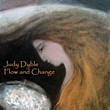|
|

Judy Dyble Judy Dyble is probably still best known as the first female vocalist of Fairport Convention. She sang on the band's first single and charming debut album and was forced to leave soon afterwards, in the spring of 1968. Along with her new boyfriend Ian McDonald she soon after teamed up with a pop trio called Giles, Giles & Fripp and participated on quite a few home recordings with them. They were finally released as the highly entertaining album The Brondesbury Tapes in 2001. One of the songs Judy sang, was called "I Talk To The Wind". A more professionally recorded version of the song surfaced on the debut album of the new aspiring quintet King Crimson the following year. By then Judy's relationship with Ian had ended and she had left the band before the name change. Instead she teamed up with Jackie McAulie, a former member of Them (Van Morrison's band in the early days, you know) in the folk-inspired duo Trader Horne, named after John Peel's nanny, no less! They released one highly recommended album, Morning Way, that sold next to nothing at the time. Disillusioned and lacking confidence, Judy left the music business for several years. She was persuaded, or forced, to join the Fairport gang onstage to sing a couple of songs on a very few occasions in the 1980s, 90s and 00s, participated on some recordings with artists of a younger generation and recorded three low profile solo albums Enchanted Garden (2004), Spindle and The Whorl (both from 2006). With Talking To Strangers (2009) she was really back in business and ready to meet up with a bigger audience. It was produced by Tim Bowness (of No-Man, Henry Fool etc. and also co-founder of the recommended online music store Burning Shed) and Alistair Murphy, and featured old friends from Fairport, King Crimson (yes, including Robert Fripp!), Jacqui McShee (vocalist of Pentangle), Celia Humphris (vocalist of The Trees) and quite a few others as guests. The album was even launched in Scandinavia on a Norwegian label and she made a couple of promotional stints for national Norwegian tv. In 2010 she recorded a new album in collaboration with Lee Fletcher and Markus Reuter. Apparently they fell out after the recordings were finished and the album was never released. So here, finally, is the follow-up to Talking To Strangers. It's produced by Alistair Murphy all on his own this time. He has also written most of the melodies to Judy's lyrics and submit keyboards or guitars the majority of the tracks. Other guests seem mainly to belong to a younger generation than last time around. Pat Mastelotto (of latter day King Crimson) takes care of drums and percussion and Julianne Regan (ex-All About Eve) contributes backing vocals as they did on Talking To Strangers. Michael Mooney (steel guitar, ex-Spiritualized) and Matt Malley (vocals, ex-Counting Crows) also contribute, along with several others I'm not familiar with. The majority of songs of Flow And Change are beautiful, melancholic chamber folk-pop, with piano, violins, viola, cello and double bass at the fore. With Judy's great mature voice on top, they're as beatuiful as can be. Breathtaking... Almost too much at a time. A clever move then, that a few in between are spiced with guitars and some other instruments that brings a bit of change to the harmonious flow. The opening song "Black Dog Dreams", with music by Simon House (the violinist from High Tide, Third Ear Band, Hawkwind and David Bowie's band at a time), is not quite the Led Zeppelin inspired number you might expect. Still it includes some dynamic electric lap steel guitar playing and keyboards to great effect. A bit more uplifting than the majority of the album. "Crowbaby" is another goodie, the pop-ballad of the album, that also includes a guitar of the electric kind and a fascinating vibes sounding keyboards. "Letters" stand out because of the guitars and the vocal duties shared with Matt Malley. A melancholic highlight. "Featherdancing" has tendencies towards a combination of elegant chamber music and music hall (can you imagine?), whereas "Head Full Of Stars" probably is the catchiest of the lot. Some great pop-hooks in there and the fascinating Mellotron-sounding keyboards bring reverberations of the 1960s... The highlight of Talking To Strangers was the almost 20 minutes epic called "Harpsong" in several parts. Judy has done it again with the almost 12 minutes long "The Sisterhood Of Ruralists", divided into several parts as well, with different melodies and instrumentation. I especially enjoy the dulcimer, the hurdy-gurdy-sounding keyboards and the elegant string arrangment of parts of this track. As with several other songs here, it seems to deal with the mysteries and mystique of nature, life, old and ancient days. It's great, but during parts of this and a couple of other songs, Judy's vocals seems a bit more restrained than usual. It sounds somewhat wearier in the high register than we're used to from her. The paintings of the front cover and inside the booklet by Catherine Hyde, Jackie Morris and others also deserve to be mentioned. They reflect the lyrics and music in an exemplary way. All in all, I guess I'd recommend Talking To Strangers as a starting point to Judy's musical world to people that are not familiar with her music. Flow And Change is not far behind, though, but lacks a bit of the variation and rougher edges compared to the former. For those who enjoy songs inspired by pop and British folk of the last five decades with a mature female voice at the centre and exquisite string and other acoustic dominated arrangements, there's no need to look any further though. Copyright © 2013 JP
|
| © 2013 Luna Kafé |